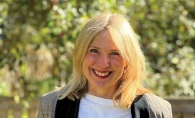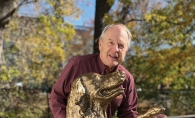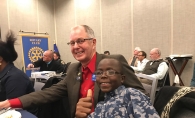For Lynn Franz and Joe Krueger, adopting Nathanael was only the first step in what has become a lifelong relationship with Guatemala. The 6-year-old is one of a handful of international adoptees who attend Cornelia Elementary.
Since bringing him home in 2008, the Edina couple has embraced Nathanael’s birth country. Intricately carved wooden Guatemalan toys keep him company in his bedroom. The family also has a clay nativity scene that they bring out every Christmas in their home near Strachauer Park, to celebrate the holidays and remind them of Guatemala.
Franz and Krueger also sponsored Martha, or “Tita,” from Guatemala, who lived with them for three years while completing high school and teaching Spanish to Nathanael. Tita is now back in Guatemala, studying law and hoping to become an advocate for women’s rights in the Central American nation’s fragile justice system.
“We fell in love with the country,” says Franz. “For us it was a great experience to share Guatemala with our son, but also to give back to the country we know and love. The whole adoption experience broadened our world.”
Nathanael was lucky, not just because he landed with a loving family in a stable and wealthy community, but because he received excellent care in a Guatemala City foster home before Franz and Krueger adopted him. He is part of a study at the University of Minnesota that examines the long-term impacts on adopted children of foster care compared with traditional orphanages.
Meeting with Nathanael’s foster parents ranks among Franz’s most powerful memories from their three trips to Guatemala between Christmas 2007 and summer 2008. The two families in Nathanael’s life dined together over rice and beans, the Guatemalan equivalent of breaking bread.
“We wanted to be with the people who clearly love Nathanael,” Franz recalls. “To this day the experience makes me weepy, hearing through an interpreter how they interacted with him on daily basis.”
The Edina couple also hired a firm to track down Nathanael’s birth mother because, as Franz says, “we wanted her to know how loved he is” and so their son could meet her one day if he chooses. Their decision reflects a sea change in attitudes toward adoption. Families open to contact with birth mothers, early in the process or once their child reaches adulthood—and even open adoptions—are now common.
The family is also fortunate because they were able to adopt Nathanael before the Guatemalan government closed the door in 2010 on foreign adoptions. The wave of international adoptions, which often follow in the wake of war or political unrest, has slowed dramatically all over Latin America, as well as in other “sending countries” such as China and Russia. Many in the adoption community, think, however, that politics often overshadows the well-being of those countries’ waiting children.
Franz has mixed feelings about the wane in international adoptions. “There’s a view of adoption you have before you adopt, and a view you have after you adopt,” she says. “It’s an incredibly personal experience for all who adopt. I’m sorry for those in the U.S. who’d like to adopt but will miss out on that opportunity.”
Franz and Krueger know some families who sought to adopt from Guatemala and now find themselves stuck in a legal limbo, with the child matched to them still in the country’s child welfare system. Nathanael, though, is happy and healthy in Edina—a community that, by their account, has embraced the diversity brought by international adoption.
“We’re thrilled by the diverse community of students at Cornelia Elementary in terms of the education he’s getting,” she says. “The school reflects the broader population of this country. It’s not a place where he feels any different from the other kids.”
The Vandersall Family
Michele Tafoya Vandersall, a sideline reporter for NBC’s Sunday Night Football, and her husband Mark, a financial advisor, will never forget that sleepless night five years ago when they first met their adopted daughter, Olivia, in Bogota, Colombia. “Meeting her was a powerful moment,” remembers Tafoya Vandersall. “She was sleeping, looked up and smiled at us. She hasn’t stopped smiling since.”
But the girl, named Valentina at birth, had been born four months prior with an aortic coarctation that didn’t allow her heart to pump blood through her body at the rate she needed to. Upon arriving at their hotel at 4 a.m., the Vandersalls were told that Olivia was in quarantine. The next day they removed her from a state-run hospital, which they say was in a shoddy condition, and put her in a private children’s hospital.
Unlike the Guatemalan adoption system, Colombia required the Vandersalls to stay in-country until the adoption process was complete. So Michele, Mark, and their son Tyler decided to make this the journey of a lifetime and remain there for seven weeks. Michele speaks Spanish, so she visited their soon-to-be daughter every day in the hospital. Meanwhile, Mark took 3-year-old Tyler to the park every day to occupy him. They found Bogota to be much safer than they had expected. It wasn’t exactly secure and comfortable, but it also wasn’t the violent place they had seen on the news.
Colombia changed the Vandersall family in ways they hadn’t foreseen. Michele and Mark enrolled Tyler in swimming lessons while in Bogota. The instructor spoke no English but Tyler just took things in stride. “I felt like the Grinch whose heart grew three sizes that day,” says Michele. “My love for my son, my admiration and appreciation for his resilience just grew exponentially.”
Now Olivia Valentina Vandersall (they kept her birth name as her middle name) is, in some ways, a typical Minnesota kid, says Michele. “But in other ways, I know the enrichment she’s brought us. Our family and our neighborhood appreciate her on a level that’s a bit different. We embrace her background and acknowledge her differences.”
Like Lynn Franz, Michele is open to Olivia returning to Colombia one day to meet her birth mother; the Vandersalls have a copy of her driver’s license and could likely locate her. “If Olivia decides when she’s 18 that she wants to go meet her birth mom, we’ll completely support her in that,” says Michele. “The caveat is that she needs to recognize all kinds of scenarios that could happen once they meet.”
The Morgan Family
Two years ago, Jennifer and Michael Morgan received the best Christmas present they could imagine when they returned from China on Dec. 23 with their adopted daughter Jia, who was just over two years old. Born with the name Diajia and left at an orphanage in Beijing, the girl now has two older siblings, 11-year-old Drew and 10-year-old Madeline.
The Morgans had long considered adopting a child from Minnesota, but stringent requirements and few babies available for adoption turned them away; they didn’t want to adopt a child who would be older than Drew and Madeline. Once they began looking, Jennifer felt drawn to China. They were willing to adopt a special-needs child, which meant their process would be quicker than average. (The typical adoption process in China can take years.)
A year after Jia was born, the Morgans received a photo of the little girl, her hand on her hip. “We saw a picture of her, and said ‘that’s her, that’s our girl,’ ” recalls Jennifer.
The Morgans traveled to China to meet Jia to show her pictures of their Edina house, their dog. Jia in turn met her future siblings via Facetime calls. When they returned just before Christmas, Jia met Drew and Madeline in person. And Jia’s older siblings have joyfully welcomed her into the family.
Jennifer says that China is never too far away. “It’s important to us to bring her culture into our family. Every year we do a Chinese New Year celebration, because it’s important to us to make sure that her culture stays with her.”
&
Last decade, Guatemala became one of the most popular “sending countries” from which American families adopted children. By 2008, approximately 1 percent of all babies born in Guatemala were adopted by Americans, aided by Guatemala’s largely privatized system that speeded the process. But the proliferation of baby adoptions, the lucrative industry surrounding the practice, and allegations of corruption and baby theft ultimately prompted the Guatemalan government to stop international adoptions by 2010.
Edina Magazine editor Jacob Wheeler wrote a book about Guatemalan adoption, Between Light and Shadow, which both celebrates the rags-to-riches journey of thousands of adoptees, and examines the degree to which it was a cold-hearted baby-selling industry.









